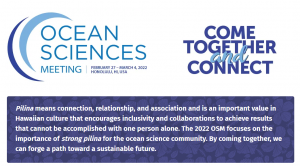Session CB15 “Application of Remote Sensing to Societally Important Regions: Coastal, Estuarine, Tropical and Polar Waters”
Session Format: In-person, at the Hawaii Convention Center
Organizers:
Jorge Vazquez, jorge.vazquez@jpl.nasa.gov
Jose Gomez-Valdes, jgomez@cicese.mx
Paul DiGiacomo, paul.digiacomo@noaa.gov
Marouan Bouali, marouanbouali@gmail.com
Remote sensing from satellites, sub-orbital and ground platforms provides valuable data for management of regions with great socio-economic importance, including coastal, estuarine, tropical, and polar waters. There has been a tremendous growth in the availability of sub-kilometer resolution data with active and passive observations spanning UV to microwave, resulting from new sensors as well as advances in scientific d ata and information processing techniques (e.g., artificial intelligence/machine learning).
ata and information processing techniques (e.g., artificial intelligence/machine learning).
In addition to current remote sensing applications in these critical regions, the session seeks contributions that demonstrate and prototype evolving and emerging capabilities in support of improved understanding and applications within these high-priority regions. Our particular focus is on satellite remote sensing to characterize (sub)-mesoscale processes and features as they relate to coastal waters for fisheries, hazards, inclusive of multiple remote sensing data sets and field observations, as well as coupled modeling and data assimilations approaches to better resolve and track this scale of features in space (local to EEZs) and over-time scales ranging from hourly to interannual. Thus, this includes satellite time series (e.g., ocean color, synthetic aperture radar) also allowing for a more holistic spatially explicit study of these regions and their impact on long-term ecological changes.
Likewise, transboundary (e.g., land-sea interface) and trans-disciplinary (e.g., physical and biological/biogeochemical; environmental & social science data) approaches are greatly encouraged, as well as studies that highlight potential technology transfer from developed to developing regions. Stakeholders of interest include researchers and applications developers, as well as managers and decision-makers within these regions of interest to help assess and better address their data user needs and requirements.
Cross listed Tracks: Coastal and Estuarine Biology and Biogeochemistry; Fish and Fisheries; Marine Ecology and Biodiversity; Ocean Biology and Biogeochemistry; Ocean Data Science, Analytics, and Management
Keywords: Ocean observing systems; Ecosystems, structure, dynamics, and modeling; Decision making under uncertainty
This session is organised in collaboration with GHRSST
Further resources:
- Abstract guidelines: https://www.aslo.org/osm2022/abstract-guidelines/
- Link to the Ocean Science Meeting 2022 OSM2022 conference: https://www.aslo.org/osm2022/
